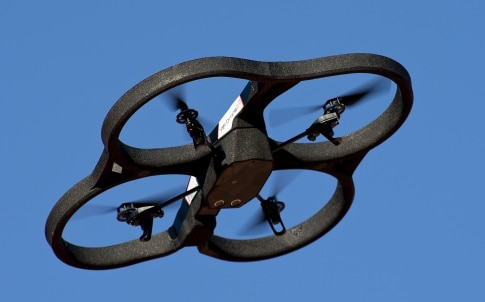 Stuart Nathan
Stuart Nathan
Features editor
Politicians will surely be unable to resist legislating on the use of commercial drones in the wake of the collision with an airliner near Heathrow. But they have to be realistic.
This Monday marked the anniversary of the death of Albert Einstein, which is as good a time as any to recall a saying often attributed to him. "There are only two things in infinite supply in the universe," he's supposed to have said, "hydrogen and stupidity. And I'm not entirely sure about the hydrogen." Sometimes the saying is attributed to Einstein, sometimes to science fiction writer Harlan Ellison, and sometimes to Frank Zappa, but whatever the attribution, it doesn't make it any less true.
The reason this adage comes to mind is because of the news that some idiot flew a drone so close to an aircraft landing at Heathrow airport that the two collided. Fortunately, only the drone was damaged and nobody was hurt; but the event, along with the revelation that there have been 25 near misses between domestic drones and aircraft in the past twelve months, has led to the inevitable - and inevitably vague - calls for "something to be done".
One issue is that it's already against Civil Aviation Authority rules to fly drones in congested areas, and drones with cameras can't be flown within 50m of another vehicle. But flying near an airport isn't specifically banned and, even though airports are clased as 'controlled airspace', drones below 7kg in weight are technically exempt from these controls.

So, what could be done? The question of why somebody would even be flying drones that close to an airliner does arise: apparently some people like to demonstrate their flying skill by taking pictures of the crew or passengers of an aircraft through the windows. See the opening remark about the inexhaustible nature of stupidity. But the CAA code could be hardened from a guideline into criminal law, with stiff penalties for breaching it (of course the dreadful prospect of terrorists using explosive-laden drones is already covered by other laws). But presumably policing this would depend on patrols actually catching someone in the act; retrospective investigation must surely be a tough call.

On yesterday's Radio 4 Today programme, 'drone lawyer' Peter Lee of Taylor Vinters spoke about the idea of 'geofencing' - using GPS co-ordinates to define 'no-fly zones' in which the drones' navigation software would be disabled. This, he added, would depend on the drones' systems being equipped with software to recognise the geofence, but installing this could be a mandatory condition of their sale. Compulsory registration of drone sales along with equipping drones with unique identifying components that could be traced back to their owners in the event of their being used illegally could be another safeguard, although there are already problems with people buying other items with the potential to be offensive weapons via the internet, and excessive need for registration does smack somewhat of authoritarianism. Moreover, no remains of the drone involved in the Heathrow collision have been recovered, and searching for fragments is surely a waste of police time.
It's also the case that as yet, there has been relatively little research into the effects of drone-strike. As we reported in the news analysis article linked above, it seems unlikely that they could cause any more damage than a birdstrike, and as a shredded drone is considerably less messy than a shredded goose probably even less. Distraction of pilots if the drone strikes the cockpit windows is probably a bigger risk, though even then the use of autopilot on landing might reduce the danger.
But clearly the issue can't merely be left, and the urge that politicians feel to be seen to be acting will probably ensure that it won't. We can only hope that the advice of experts in the technology as well as legal experts like Mr Lee will both be sought and heeded. We can't eliminate idiocy, as Einstein (or Ellison, or Zappa) said, but we can try to reduce its effects.

On a very different note, my colleagues and I were shocked and saddened to hear of the death last week of Professor Sir David MacKay at the tragically young age of 48. Most of us crossed paths with David during his time as chief scientific advisor to the Department of Energy and Climate Change between 2009 and 2014, and we were unfailingly struck by his clarity of thought on the vexed issues of energy and climate, his insistence on evidence and the need to base policy on verified data, whether that policy concerned the siting of windfarms or advice to the public on whether to unplug phone chargers.
His book Sustainable Energy - Without the Hot Air is and will doubtless remain one of the key texts on the subject. What's even more remarkable is that, as we explained in this interview with David that we ran in 2010, the book was written in his spare time and it wasn't even his primary area of expertise; a mathematician and physicist, Prof MacKay had spent his career to that point researching human-machine interfaces and natural language processing, and lectured on this at the University of Cambridge for 15 years. Among his many other achievements was securing a retrial for Sally Clarke, who had been wrongly convicted of murdering her two sons on the basis of a mistaken interpretation of the statistics of DNA evidence.
But what struck you on meeting David was his friendliness, his willingness to talk and his desire to communicate in simple, understandable language, which as his blogs during his final illness show, never diminished. Some people may not be as convinced as he was of the link between carbon dioxide emissions and climate change, but nobody could fail to be impressed by his sincerity and dedication to linking his conclusions to hard, verifiable science. He's a great loss and we at The Engineer would like to pass on our condolences to his family, friends and colleagues.





Report highlights significant impact of manufacturing on UK economy
Note to Evil Villain/Dave 2020. Thatcher was PM for _11_ years, from 1979 to 1990 so no one under the age of 34 was even born when she left office....